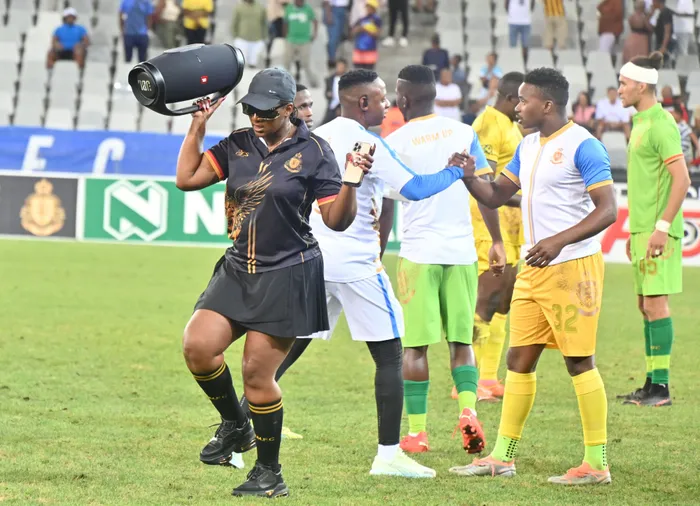Enigmatic Royal AM owner Shauwn Mkhize: 'I'm too sexy for my shirt,' so what!
Shauwn Mkhize, the enigmatic owner of Royal AM, faces a significant setback after the Pretoria High Court dismissed her club's bid to regain PSL status

Royal AM Royal AM owner Shawn Mkhize was, for a long time, a thorn in the side of the PSL. Picture: ANA
Image: ANA
WHEN thinking of Shauwn Mkhize, one is tempted to think of that musical lyric proclaiming one’s allure: 'I'm too sexy for my shirt'.
The excessive cleverness and cunning of Mkhize, the larger-than-life, enigmatic owner of the beleaguered football club Royal AM, have tripped her up again. She has been overly clever, too cunning, and was caught out by her schemes to save her beloved club, Royal AM, named after her son Andile Mpisane.
The ruling announced on Tuesday by the Pretoria High Court may finally end Royal AM's efforts to regain its Premier Soccer League (PSL) status. The court dismissed her case with costs.
Last week, Judge Boitsheko Seleka reserved judgment and decided on a later date for the verdict. Around this time, there was speculation that Royal AM could win the case.
Being the owner of Royal AM, it has been a long and arduous journey for Mkhize. Even before she bought Bloemfontein Celtic's franchise, she was in trouble with the PSL.
After Royal AM finished runners-up on the GladAfrica Championship's (National First Division) final standings and the PSL's promotion-relegation playoffs, it started a legal battle to overturn Sekhukhune United's automatic promotion to the Premiership.
The club refused to participate in the playoff matches, and after they lost a few arbitrations, they approached the Supreme Court of Appeal in Bloemfontein.
When all else failed, Mkhize brought Bloemfontein Celtic's franchise, and Royal AM was finally playing in the Premiership.
Fast forward to January 2025, the PSL Executive Committee, after three meetings, suspended Royal AM from all future matches.
From that point onwards, Mkhize navigated the swirling currents of the football world as several legal battles came under the spotlight. During this time, she angered fans after she disclosed player salaries. This revelation sparked outrage and accusations of unfair labour practices because of significant discrepancies.
Now more than ever, football fans are questioning the club's financial management and ethical standards, giving rise to the term 'dirty hands' because of perceived questionable practices, possibly involving financial dealings or other forms of manipulation.
This episode reflects a broader issue in local professional soccer, where pay disparity has often been a contentious topic. The salary figures disclosed by Mkhize serve as a particularly striking reminder of the challenges faced by many players as they navigate their careers on the South African landscape.
Clubs must ensure increased transparency and a commitment to secure a more equitable environment for all players involved.
As the dust settles on this landmark ruling, one thing is clear: the court's verdict underscores the necessity for unwavering compliance with the PSL's regulations.
This should herald a new chapter in South African football, one that emphasises not just ambition, but also responsibility and adherence to protocol.
Related Topics: